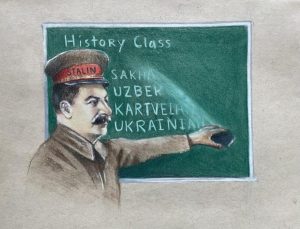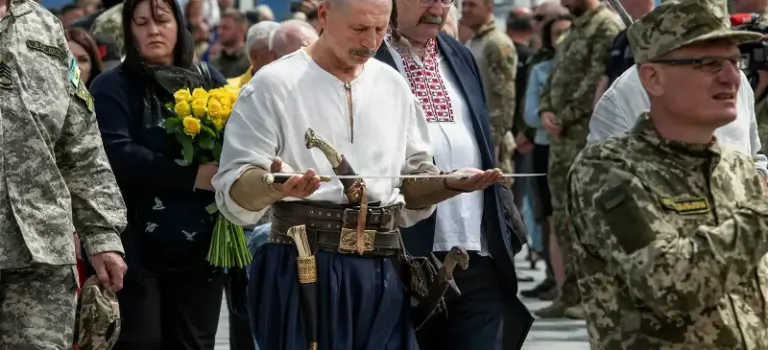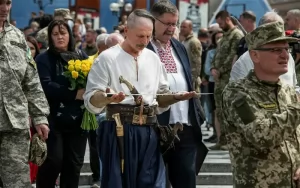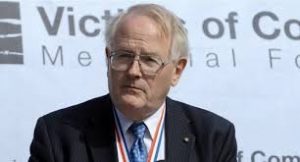Paul Goble’s 50 Windows on Eurasia March 26, 2023
Month: March 2023
New look at “War and Peace”: why we need to recognize and study Russian imperialism
New look at “War and Peace”: why we need to recognize and study Russian imperialism

As a result of the imperialist policies of the Russian Empire, the USSR, and modern Russia, many cultures and whole ethnic groups were close to being erased. Instead of unique cultural identities of variuos colonized nations, Russia for centuries imposed the one “great” Russian identity, forcing its language and culture on other peoples.
March 14, 2023
When I come across the “aesthetics” reels on Instagram about Anna Karenina or the shabby panel buildings of the former USSR or see my American peers put communist symbols on their laptops, I wonder if they would similarly celebrate the British empire or the US colonists. When I think of the USSR and Russia, I do not see the cute images or political ideals. I think of their imperialistic policies, my family, my people and many other nations, whose history and culture was either stolen or ridiculed and who were subjected to endless poverty and persecutions by Moscow rulers.
The challenge of recognizing Russian colonial imperialism comes mainly from a West-centered view on the issue. In the more well-known examples of British or French Empires, colonization was rooted in racism, which was not always the case in Russia. Moreover, the conflict between Russia and the West caused many to associate the former with being an anti-West and, thus, anticolonial power. While the first assumption is not false, the second one is far from being true.
In the early 20th century, when colonialism finally started to lose support in the West, Moscow began to broadcast an image of an anti-colonial champion to international audiences. Lenin even famously named colonialism the final stage of capitalism. Putin in his recent speech about the illegal annexation of several Ukrainian regions called Russia’s actions “decolonization” and in 15 minutes mentioned the word “colonialism” 11 times. Despite such rhetoric, the Russian empire, the USSR and now Russia have continued to build typical colonial structures inside their borders. Read more

Think Tanks in Democratic Countries

Haphazard Accusations: Circassians Don’t Beg for a Certificate of Good Conduct from Russia
Haphazard Accusations:
Circassians Don’t Beg for a Certificate of Good Conduct from Russia
Adel Bashqawi
March 15, 2023
Russia’s Two-Headed Eagle Came Not from Byzantium but from Golden Horde and the Tatars, New Kazan Study of Muscovy Says
Friday, March 10, 2023
Russia’s Two-Headed Eagle Came Not from Byzantium but from Golden Horde and the Tatars, New Kazan Study of Muscovy Says
Paul Goble
Staunton, Mar. 8 – In 1975, the Kazakh writer Olzhas Suleimenov stirred up a firestorm of criticism in Moscow for his book Az i Ya, which discussed the Turkic origins of the Russian chronicle, The Tale of Igor’s Campaign. Now a new book by Kazan authors about Mongol and Turkic elements in Muscovy threatens to do something similar. Read more

Cossackia: A Potentially Powerful Bulwark Against Russian Imperialism
Cossackia: A Potentially Powerful Bulwark Against Russian Imperialism
March 14, 2023

Cossackia, the land east of Ukraine and north of the North Caucasus in the Russian Federation, is the traditional home of the three largest Cossack communities: the Don, Kuban and Terek hosts. As such, it has the potential to become a powerful bulwark against Russian imperialism, a defender of Ukraine and an ally of the West, its activists argue (T.me/Ertaul, March 11). But despite these very real prospects given the territory’s enormous natural wealth and geographic location astride the north-south and east-west trade routes Moscow has relied on to project power, Cossackia as a potential country remains more often a subject of dismissive laughter for the West than one that evokes serious attention. Three major reasons undergird this failure, and not one is justified.
First of all, many Western analysts remain not only Moscow-centric with regard to all communities outside the Russian capital but also prisoners of Hollywood and Soviet propaganda, in particular about the Cossacks. This propaganda blames the Cossacks for pogroms others ordered them to take part in and fails to pay much attention to the Soviet genocide of the Cossacks (Window On Eurasia, January 29, 2020; January 28). Second, those who know more about the Cossacks doubt that any Cossack state is possible due to the enormous diversity of the Cossack community and its geographic dispersion. As a result, they refuse to recognize the three largest hosts as predominant. And third, the West has not recognized that, in Putin’s Russia, two very different groups of people are referred to as Cossacks and that, following what happens to one group, mentions nothing about how that affects the other. Read more
Paul Goble’s 50 Windows on Eurasia March 12, 2023
Paul Goble’s 50 Windows on Eurasia March 12, 2023
Note from compiler: This week, I begin four weeks of daily radiation treatment for my second kind of cancer. Preparations for that have already slowed my production of Windows, and this new round of treatment is likely to slow that down still further. I will do what I can but ask for your understanding. Thanks. Paul Goble



